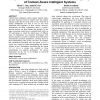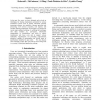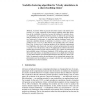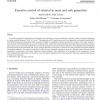27 search results - page 2 / 6 » Computer generation of process explanations in nuclear astro... |
CHI
2009
ACM
14 years 6 months ago
2009
ACM
Context-aware intelligent systems employ implicit inputs, and make decisions based on complex rules and machine learning models that are rarely clear to users. Such lack of system...
EXACT
2007
13 years 8 months ago
2007
In the past five years, we have designed and evolved an interlingua for sharing explanations generated by various automated systems such as hybrid web-based question answering sys...
BMCBI
2007
13 years 5 months ago
2007
Background: Scientific workflows improve the process of scientific experiments by making computations explicit, underscoring data flow, and emphasizing the participation of humans...
SCHOLARPEDIA
2011
12 years 8 months ago
2011
Abstract. Scientists’ ability to generate and collect massive-scale datasets is increasing. As a result, constraints in data analysis capability rather than limitations in the av...
COGSR
2011
13 years 23 days ago
2011
In verb/noun generation experiments, participants have to produce a word associated with a stimulus (usually a noun) and belonging to a given syntactic category (“verb” or “...




